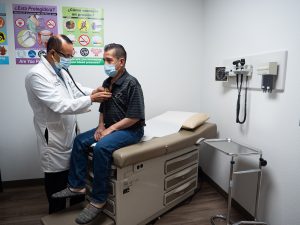- Slug: BC-CNS Health Care Partnership, 600 words.
- 1 photo and caption below.
By Emma Richburg
Cronkite News
PHOENIX – A new $10 million partnership will put medical students and other care providers under one roof to serve people of color and other underprivileged communities in Maricopa County. The partnership between Creighton University, St. Vincent de Paul and Virginia G. Piper Charitable Trust was announced Thursday.
For more than a decade, students in their third and fourth years at Creighton’s medical school, as well as faculty members, have volunteered monthly at the Virginia G. Piper Medical Clinic in Phoenix. Now the clinic will be the main teaching facility for first and second year students, too. Together they will help underrepresented communities and uninsured Arizonans receive medical care that’s currently out of reach.
Many uninsured Arizonans do not have access to preventative or specialty care, and they end up in emergency rooms because of unmanaged chronic disease. This can result in poorer outcomes for patients long-term, but it also increases the cost of care that hospitals must absorb.
Under the partnership, the Creighton School of Medicine will hire a Virginia G. Piper chair in medicine and chief medical officer. The chair will be embedded at St. Vincent de Paul’s Virginia G. Piper Medical Clinic near downtown Phoenix.
Dr. John Anwar, the medical director of the clinic, said many uninsured people use the hospital as their only form of health care, which he calls a “daily issue” he sees in emergency rooms “because these patients’ health problems have gotten to the point where they are so severely complicated” from inconsistent medical care.
According to the United Health Foundation’s 2020 Arizona Summary, 11.3% of Arizona’s population was uninsured last year, and the budget for public health was $57 per Arizonan.
Mary Jane Rynd, president and CEO of Virginia G Piper Charitable Trust, said the COVID-19 pandemic has highlighted the urgency and need for this program.
“Our response cannot wait,” she said. “Now is the time for higher education, social services and philanthropy to join and use our collective capacity to create a healthier, more resilient future.”
The new partnership aims to reduce growing health disparities that disproportionately affect low-income populations and people of color in Maricopa County while also giving hands-on learning experiences for Creighton medical students.
Randy Richardson, the regional dean at Creighton University Phoenix campus said the students will be Arizonans who “rotate through SVdC as part of their training.” People who are uninsured and struggling to receive medical care will be referred to the clinic where students who are studying everything from medicine to physical therapy, will help.
“We are integrating their curriculum so they are learning aspects about the basic sciences and then actually applying them to the clinical arena,” Richardson said.
“Good health care is not obtained by going to the emergency room every time you’re so sick that you just can’t take it anymore,” said Richardson. “We want to improve their overall health and then work on funneling them into a federally qualified health clinic.”
The partnership will work with health systems in the Phoenix area to improve the overall effectiveness of uninsured-patient referrals to hospitals within the Arizona Safety Net System, which provides services to those who need it most through 40 clinics.
“All of this can be avoided if they are given access to a physician who will prescribe the correct prescriptions and coordinate the proper care and allow the patient to access multispeciality care,” Anwar said. “All of this can be avoided, so when I see this over and over every day I just think of what I can do for these people.”
For more stories from Cronkite News, visit cronkitenews.azpbs.org.
^__=
